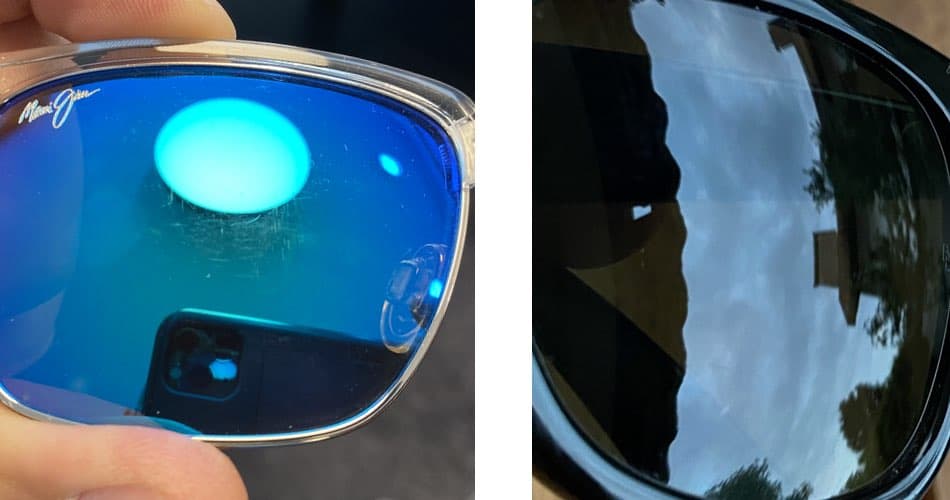Sunglasses with real glass lenses are found today only in the higher quality sunglasses manufacturers. The beauty of glass lenses is their durability. It is not uncommon for sunglasses with glass lenses to look practically worn from the surface after eight to nine years, even though they have not been treated with extreme care.
In turn, scratches on plastic lenses usually cannot be prevented even with optimal care. So you can already see how big the differences are in terms of surface hardness of real glass lenses in sunglasses compared to plastic lenses.
In this article, we would like to go into the differences of sunglasses and have the glass lenses compared to the plastic versions and what you should look for when buying when it comes to configuration.
Let’s start now with the differences between glass and plastic lenses, so you can find out which is now better for you in everyday life.
What Is the Advantage of Glass Lenses Over Plastic Lenses for Sunglasses?
The advantages with classic glass lenses are the surface hardness and better optical quality of glass lenses over plastic lenses. Sunglasses with glass lenses have a higher abbe number than plastic lenses. There are actually sunglass wearers who can see the difference when they look through a real mineral lens and then look through a plastic lens. However, this is not the case for everyone.
As a rule, the difference in sunglasses is then described as somewhat clearer and more brilliant in the sunglass lenses. However, this effect also depends on the particular sunglass lenses that are compared. You should always compare sunglass lenses of the same category in such a comparison.
So not polarized glass and plastic lenses in sunglasses. Or contrast enhancing glass sunglass lenses with plastic lenses. Or compare polarized plastic and glass sunglass lenses with each other. If you mix the categories together and try to compare, the comparison always limps.
The next advantage of sunglasses with glass lenses is the hardness of the glass surface. We ourselves wear our sunglasses, of course, and the difference in terms of longevity of glass lenses compared to plastic lenses is stark. We can’t put it any other way. Even after years of use, whether in the car or frequent swimming pool use, the surface remains almost unscratched and unworn.
Take a look at the pictures of older sunglasses with glass lenses (approx.40 years old) and sunglasses with plastic lenses (approx. 5 years old), which were used daily for approx. 20 minutes.

What Are the Disadvantages of Glass Lenses in Sunglasses Compared to Sunglasses With Plastic Lenses?
Sunglasses with glass lenses also have their disadvantages. One disadvantage is that sunglasses made of glass might shatter in case of a fall. On the other hand, they are somewhat heavier than the sunglasses with plastic lenses.
This makes depending on the sunglasses model a 3-4 grams and sounds quite little at first. However, even a few grams of weight difference is clearly noticeable on the nose for people who have a sensitivity to pressure.
Our tip here is to test the sunglasses beforehand and if you are unsure, just take the sunglasses home to test them and leave them on your nose for 20-30 minutes to see if the sunglasses with glass lenses are still comfortable for you.
Which Manufacturers Produce Sunglasses With Mineral Lenses?
Below you will find a list of manufacturers who also have mineral sunglasses in their program. Whether the lenses of the sunglasses are made of plastic or glass depends on the model.
- Etnia Barcelona
- Maui Jim
- Ray Ban
All the above manufacturers have different tints in the program, which have different contrasts. It is best to test out the different lenses on a sunny day before buying and pay attention to details in your surroundings, for example edges on houses or shading, to determine where the contrasts are most comfortable for you.
The following configuration options significantly affect your perception of sunglasses in terms of contrast:
- Polarization
- Back surface anti-reflection coating
- Contrast enhancement
Are There Mineral Lenses, Also Polarized?
Mineral sunglass lenses are also available polarized. The manufacturer Maui Jim, for example, has exclusively polarized sunglasses in its program. In turn, Etnia Barcelona, for example, has non-polarized as well as polarized glass sunglasses in its portfolio.
So What Is the Right Lens Configuration for Me in Sunglasses?
If you use sunglasses in everyday situations, like driving or at the beach, then sunglasses with glass lenses are great. In most cases, polarized sunglasses with back surface anti-glare are the best choice for you.
However, there are always pros and cons with any configuration. For example, with polarized lenses, you can no longer see head-up displays in your car. Partially, your smartphone will also have a bit of a bluish tint towards purple depending on what angle you hold it at.
This is not annoying in most cases. Once you know the pros and cons and have looked through the lenses yourself (testing different tints) you can decide which is the best lens configuration.
In any case, a back surface anti-reflection coating makes sense on your sunglasses with glass lenses. This is because the darker the tint is in your glasses, the more you will notice reflections of things behind you on the back surface of your sunglasses.
A back surface anti-reflective coating reduces that significantly. However, glasses that have sporty, more curved lenses first eliminate this completely. And also gives you more UV protection via better coverage over the side.
A recommendation from our side are the sunglasses from Maui Jim and Etnia Barcelona. In terms of durability, all sunglasses are virtually the same when it comes to scratch resistance.
However, Maui Jim and Etnia Barcelona have a couple of tints in their lineup that raise the contrast quite nicely. The effect is slightly more vibrant colors. The green on the trees simply looks more intense. In addition, from our point of view, the back surface antireflection coatings are better on the aforementioned brands than on competitors.
Experience With Sunglasses With Glass Lenses
The experience with glass lenses in sunglasses is consistently positive. Very few prospective customers complain about the higher weight. However, it is usually noticed that the glasses still have scratched lenses even after years. And that, of course, is a big advantage.
Furthermore, it is also about sustainability. Not only do sunglasses with glass lenses last much longer, the glass sunglasses can also be recycled at a much higher rate.
